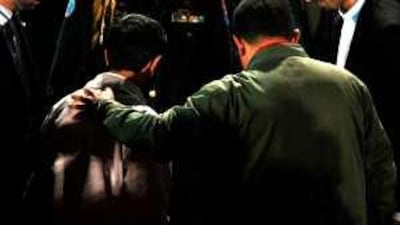WASHINGTON // Iran has moved to substantially increase its diplomatic, trade and military ties to countries in South America, posing a new challenge to US authority in the Western Hemisphere, a group of experts told a joint congressional subcommittee on Tuesday. The westward expansion has helped Iran blunt the effect of US and UN sanctions, several witnesses told members of the House foreign affairs committee. Some said the developments pose a direct security threat to the United States.
"By developing close regional ties, Iran has the ability to leapfrog its international isolation, while making common cause with others who have self-identified as opposing the United States and other western nations," said Eric Farnsworth, vice president of the Council of the Americas, who testified at the hearings. "At the very least, these are issues that should be watched with a careful, wary eye."
The Islamic republic has 11 embassies in Latin America; six - in Nicaragua, Colombia, Bolivia, Chile, Ecuador and Uruguay - have opened since Mahmoud Ahmadinejad was first elected president in 2005. Next month, Mr Ahmadinejad is scheduled to meet the outgoing Brazilian president, Luiz Inacio Lula da Silva. A previously scheduled meeting between the two leaders was cancelled last year amid protest from the Brazilian Jewish community. Some analysts here worry that the meeting, scheduled for the end of November, will confer a new degree of legitimacy on the Iranian regime at a crucial point in the West's efforts to isolate Iran over its secretive nuclear programme.
An even greater threat to the United States, the experts said, is Iran's close partnership with Venezuela and the emerging bond between Mr Ahmadinejad and Hugo Chavez, the Venezuelan president. The two leaders, united in their hostility towards the United States, have cooperated on an array of diplomatic and financial initiatives, from the establishment of binational banks to the trade of raw materials, which may include uranium, the experts said.
In a speech at the Brookings Institution last month, Robert Morgenthau, the New York district attorney, who said his office had gathered information on various forms of illegal activity involving Iran, described the relationship between Iran and Venezuela as a "cozy financial, political and military partnership". "Now is the time for policies and actions in order to ensure that the partnership produces no poisonous fruit," he said.
Iran's ties with other regional players that have been critical of the United States, including Nicaragua, Bolivia and Ecuador, have also raised concerns here, according to Douglas Farah, an expert on financial investigations and transparency at the Virginia-based International Assessment and Strategy Center. In his testimony he described Iran's dealings with those countries as "generally opaque" and built on the "personal dynamic" between Mr Ahmadinejad and Latin American leaders.
"These personalised relationships have largely supplanted institutionalised, formal policies guided by input from the respective congresses or ministries of foreign affairs and economic issues," he said. Experts have different estimations of the threat Iran's presence in the West poses to the United States. Norman Bailey, an expert on economic statecraft at the Institute of World Politics in Washington, said he believes Iran's westward expansion is "designed to facilitate the funding of terrorist organisations" and jeapordises US security. In prepared testimony, he cited "extensive" Iranian involvement in drug trafficking, including transshipment of cocaine through West Africa to Europe in bags marked "cement".
"It is becoming increasingly clear that one of the principal motivations of all this activity [by Iran] is to be able to retaliate against the United States if it is attacked," he added, noting that retaliation could include trying to block the Panama Canal. Still, others such as Mr Farnsworth of the Council of the Americas, said it is too soon to judge Iran's intentions and cautioned against overreacting. He pointed to concerns voiced this year in Washington - most prominently by the secretary of state, Hillary Clinton, - about a "huge" Iranian embassy under construction in Nicaragua, which US officials interpreted as a threat. A story in The Washington Post in July revealed that the "mega-embassy" did not exist.
"If their intentions are purely benign, then we want to make sure that we don't overreact in a way that would frankly be counterproductive," Mr Farnsworth said in an interview. "I think there's a political agenda behind [Iran's expansion in Latin America] - But is it simply trade and economic relations? Is it international legitimacy? Is it actually trying to export revolution to the hemisphere? That's where the questions arise."
For now, US legislators said they are sceptical of Iran's intentions and will continue to closely monitor developments. Eliot Engel, a New York Democrat and chairman of the House foreign affairs subcommittee on the Western Hemisphere, said he has "serious concerns" about Iranian influence in the region. He pointed to the 1992 bombing of the Israeli Embassy in Buenos Aires that killed 30 people and the bombing of the Israeli-Argentine Mutual Association in 1994, which killed 85 people. Argentine authorities have concluded that Hizbollah carried out both bombings with help from Tehran.
"Is Iran's expanded presence in the Western Hemisphere nothing more than an effort to earn some hard currency?" Mr Engel said in his opening remarks. "I doubt it strongly." sstanek@thenational.ae

